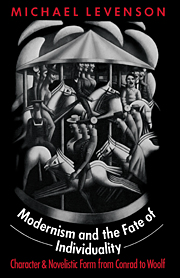Book contents
- Frontmatter
- Contents
- Preface
- Acknowledgements
- 1 Two cultures and an individual: Heart of Darkness and The Ambassadors
- 2 Liberalism and symbolism in Howards End
- 3 Justification, passion, freedom: character in The Good Soldier
- 4 Form's body: Lewis's Tarr
- 5 “The passion of opposition” in Women in Love: none, one, two, few, many
- 6 From the epic To the Lighthouse
- Notes
- Index
5 - “The passion of opposition” in Women in Love: none, one, two, few, many
Published online by Cambridge University Press: 16 September 2009
- Frontmatter
- Contents
- Preface
- Acknowledgements
- 1 Two cultures and an individual: Heart of Darkness and The Ambassadors
- 2 Liberalism and symbolism in Howards End
- 3 Justification, passion, freedom: character in The Good Soldier
- 4 Form's body: Lewis's Tarr
- 5 “The passion of opposition” in Women in Love: none, one, two, few, many
- 6 From the epic To the Lighthouse
- Notes
- Index
Summary
The value behind values in Women in Love is integrity, not in the moral sense of the term, but in a sense that may be taken as a foundation for morality, integrity as a form of completion, perfection and coherence that justifies our strivings but needs no justification itself. An eye that lingers over the self-containment of a flower or a landscape in vast panorama is an eye that delights in integral and uncompromised wholeness. That is Lawrence's eye. But what arouses Lawrentian wrath and ignites this wrathful novel is the perception that wholeness has indeed been compromised, has been streaked, stained and discolored in faint but ominous ways. Here is part of the description of Shortlands, the Crich family home.
Shortlands looked across a sloping meadow that might be a park, because of the large, solitary trees that stood here and there, across the water of the narrow lake, at the wooded hill that successfully hid the colliery valley beyond, but did not quite hide the rising smoke.
The smoke that curls into the meadow makes a fit image for the disruption of integrity, and it also enforces the historical character of the problem. Industry scars the landscape – “No flowers grow upon busy machinery” (p. 262) – but industry is only the proximate historical influence. Machinery is no more the first cause than flowers are the final victims.
- Type
- Chapter
- Information
- Modernism and the Fate of IndividualityCharacter and Novelistic Form from Conrad to Woolf, pp. 145 - 165Publisher: Cambridge University PressPrint publication year: 1991



